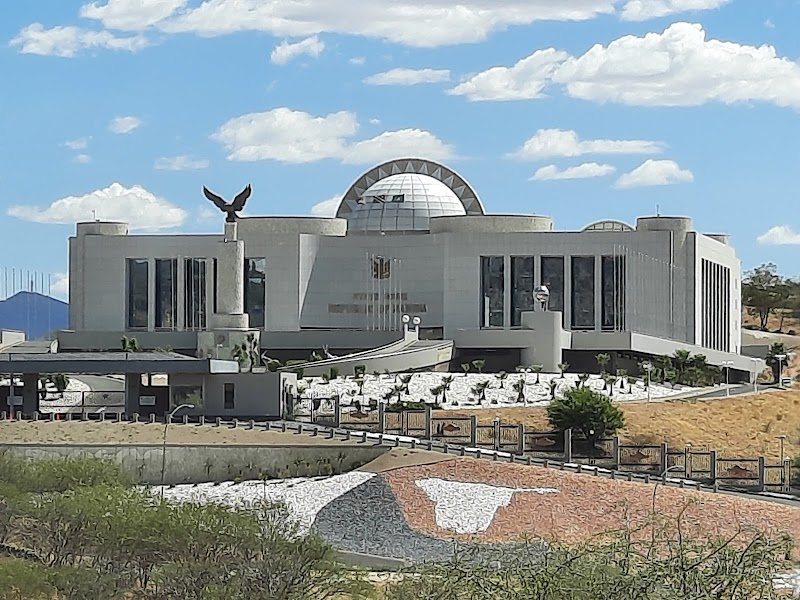Sam Nujoma, the first President of Namibia, served from 1990 to 2005. He played a pivotal role in the country’s liberation struggle and its transition to democracy.
Nujoma was born on May 12, 1929, in the village of Etunda, in the Ohangwena Region of Namibia. He belonged to the Ovambo ethnic group, the largest in the country. Nujoma’s passion for politics began early, and he joined the South West Africa National Union (SWANU) in 1957. However, he later became disillusioned with SWANU and, in 1960, co-founded the South West Africa People’s Organization (SWAPO), a more militant group committed to armed struggle against South African rule.
Nujoma led SWAPO in a protracted guerrilla war against South African forces. Under his leadership, SWAPO successfully mobilized international support for Namibia’s independence and gained recognition as the legitimate representative of the Namibian people. In 1989, Namibia held its first free and fair elections, and Nujoma was elected as the country’s first President.
During his presidency, Nujoma focused on promoting national reconciliation, economic development, and social justice. He implemented policies to address the legacy of apartheid and improve the lives of the previously disadvantaged majority. Nujoma also played a key role in regional and international diplomacy, advocating for peace, stability, and cooperation.
Nujoma stepped down from the presidency in 2005, after serving for three terms. He remains a respected figure in Namibia and is widely regarded as the father of the nation. His legacy includes the successful liberation of Namibia from South African rule, the establishment of a stable and democratic government, and the promotion of economic development and social progress.
Some notable achievements and legacies of Sam Nujoma include:
- Leading SWAPO in the liberation struggle against South African rule and achieving Namibia’s independence in 1990.
- Promoting national reconciliation and unity after independence, fostering a spirit of tolerance and cooperation.
- Implementing policies to address the legacy of apartheid, including land reform, affirmative action, and education initiatives.
- Playing a key role in regional and international diplomacy, advocating for peace, stability, and cooperation.
- Overseeing significant economic growth and development during his presidency, reducing poverty and improving living standards for many Namibians.
- Establishing a strong foundation for a democratic and prosperous Namibia, laying the groundwork for continued progress and stability.
Emblem of Namibia
To enrich your insights into presidential figures worldwide, also explore some prominent first presidents from other countries, such as Myanmar, Mozambique and Morocco. Delving into the leadership journeys of these figures can offer valuable perspectives on their historical significance and pivotal roles in shaping global politics.
The official residence and symbol of the Namibia President
10 Iconic Presidents Who Shaped Namibia’s History

Namibia is a country located in southwestern Africa. Since gaining independence from South Africa in 1990, Namibia has had a number of presidents who have played significant roles in the country’s development and governance. Here are ten of the most popular presidents in Namibia’s history:
- Sam Nujoma: Sam Nujoma served as Namibia’s first president from 1990 to 2005. He played a crucial role in the country’s liberation struggle and is widely regarded as a national hero.
- Hifikepunye Pohamba: Hifikepunye Pohamba succeeded Nujoma and served as Namibia’s second president from 2005 to 2015. He focused on poverty alleviation and rural development, earning recognition and respect both domestically and internationally.
- Dr. Hage Geingob: Dr. Hage Geingob is the current president of Namibia, having taken office in 2015. He previously served as the country’s Prime Minister and has worked towards social and economic progress, particularly through poverty reduction initiatives.
- Samuel Shafiishuna Nujoma: Samuel Shafiishuna Nujoma, commonly known as Utoni Nujoma, is the son of Sam Nujoma and a prominent Namibian politician. He held the position of Minister of Foreign Affairs under his father’s presidency and was also active in the liberation struggle.
- Nahas Angula: Nahas Angula served as Namibia’s Prime Minister from 2005 to 2012, working closely and effectively with President Pohamba to implement various development programs. He has also held other important ministerial positions during his political career.
- Andimba Toivo ya Toivo: Andimba Toivo ya Toivo was a notable anti-apartheid activist and politician who played a key role in Namibia’s struggle for independence. He served as the Minister of Mines and Energy and Minister of Labour and fought for social justice and equality in Namibia.
- Hidipo Hamutenya: Hidipo Hamutenya was a prominent Namibian politician who served as Minister of Trade and Industry and Minister of Foreign Affairs. He played a crucial role in shaping Namibia politically and was known for his commitment to regional integration and economic development.
- Nickey Iyambo: Nickey Iyambo is a medical doctor and politician who served as Namibia’s Vice President under President Pohamba from 2015 to 2020. He has made significant contributions to the health sector and has been actively involved in community development initiatives.
- Pendukeni Iivula-Ithana: Pendukeni Iivula-Ithana is a Namibian politician and former Minister of Home Affairs and Immigration. She is recognized for her strong stance against corruption and her efforts to promote gender equality and women’s empowerment in Namibia.
- Saara Kuugongelwa-Amadhila: Saara Kuugongelwa-Amadhila is the current Prime Minister of Namibia, having held the position since 2015. She has been instrumental in implementing economic reforms and pursuing sustainable development in the country.

